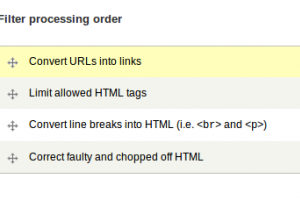Leverage the filter system, convert plain text URLs into links in drupal.
This small post will explain how you can leverage the filter system to apply it to external data:
- Convert plain text URLs into links in drupal.
- Limit allowed HTML tags
- Convert line breaks into HTML
- Correct faulty and chopped off HTML
You can call every filter from code if you want to. Let us say that you have a custom ds field that is pulling data (html) from somewhere.
<?php
// Use the database we set up earlier
db_set_active('db_integration');
// Get your data
//OutputWordScanner by cid, tid and source to get the test name and words. Display like "test: words"
$field = 'field_' . $node->type . '_tid';
$results = db_query("SELECT * FROM {CustomOutputSuggestor} WHERE cid = :cid AND source = :source AND tid = :tid", array(
':cid' => $account->field_cid['und'][0]['value'],
':source' => str_replace('tender_', '', $node->type),
':tid' => $node->{$field}['und'][0]['value'],
)
)->fetchAll();
// Go back to the default database,
db_set_active();
//Process the results from the query
module_load_include('module', 'filter', 'filter');
$filter = new stdClass();
$filter->settings = array(
'filter_url_length' => 80,
);
foreach ($results as $result) {
$data .= '<div class="suggestion-test-suggestion">' . _filter_url($result->suggestions, $filter) . '</div>';
}
// Save result of the data to the cache
$expire = time() + variable_get('db_expire_time', 3600);
cache_set($user->uid . '-' . $node->nid . '-' . 'suggestion', $data, 'cache_tests', $expire);
?>The data that we are pulling contains links so we want those links to be formatted correctly. This you can do by using the snippet:
<?php
module_load_include('module', 'filter', 'filter');
$filter = new stdClass();
$filter->settings = array(
'filter_url_length' => 80,
);
_filter_url($result->suggestions, $filter)
?>The snippet creates a class with settings and then executes the filter_url filter to filter the results for urls to convert.
You can do this for every filter. For example you want to:
- limit allowed HTML tags? You can create a setting with the allowed tags and have it filter.
- You want to chop of faulty html? A common problem when importing html from other sources.


Add new comment